As we reach the midpoint of the year, the Central Indiana single-family homes market continues to display dynamic shifts across its counties. From the bustling urban landscapes of Hamilton County to the scenic retreats of Brown County, each area offers a distinct perspective on the current housing market. This is our interpretation based on the data provided by MIBOR Market Insights, examining trends observed from May 2024 to June 2024 and providing a comparative look at year-over-year data from June 2023 to June 2024. Whether you're a prospective buyer or seller, understanding these trends is essential for making informed real estate decisions in today's evolving market.
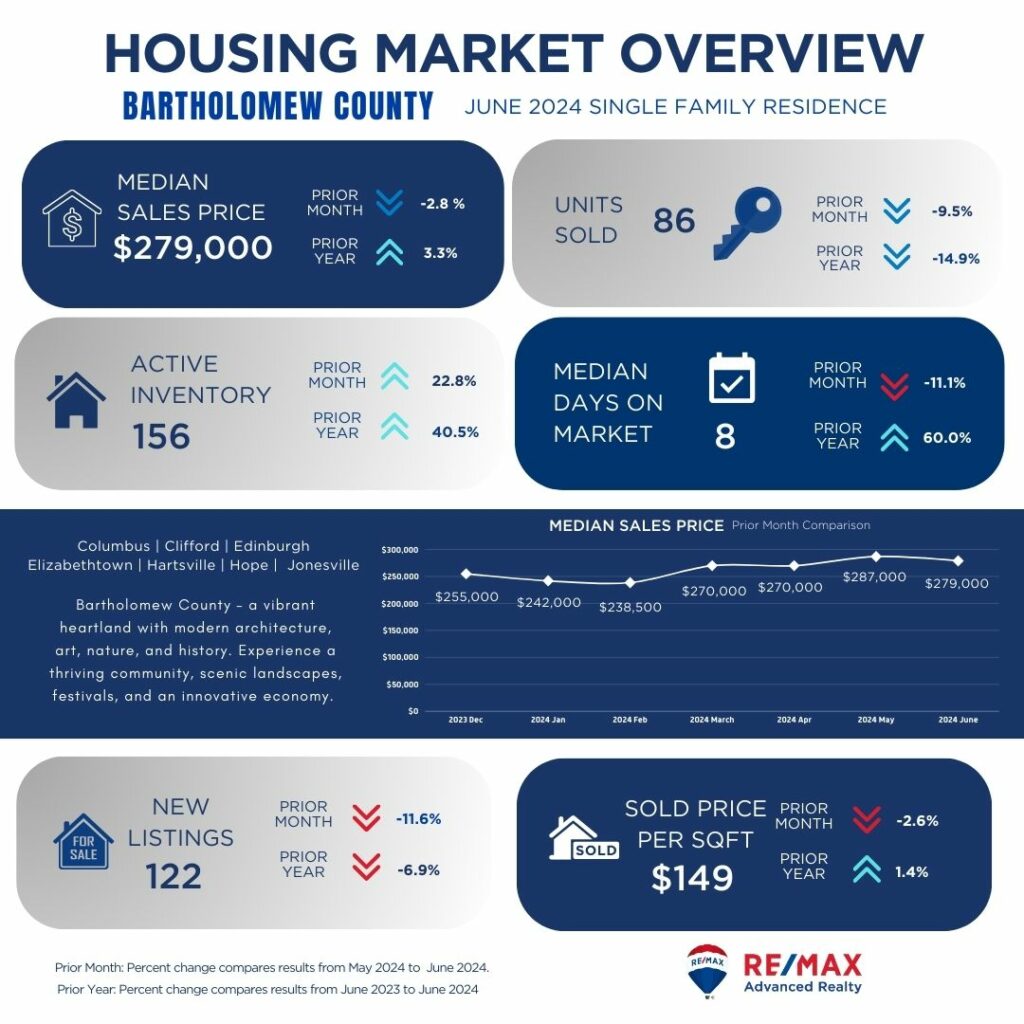
Bartholomew County shows a stable market with a slight decrease in median sales price compared to the previous month but a modest increase year-over-year. The decrease in units sold suggests a slower market pace, providing buyers with more negotiating power. Active inventory has increased, offering buyers more choices, although fewer new listings may limit options. Properties are selling quickly with a low median days on market, indicating continued demand despite some price fluctuations.
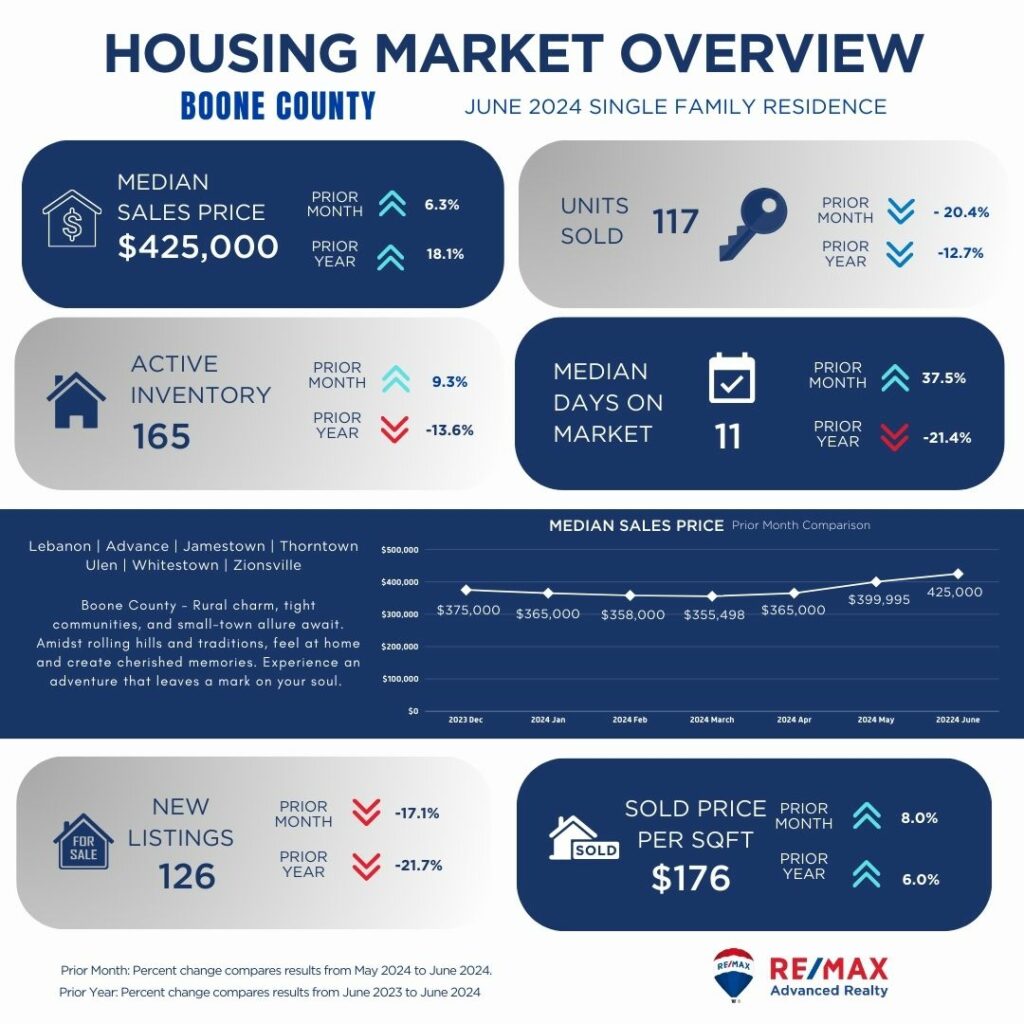
Boone County demonstrates a strong market with a significant increase in median sales price month-over-month and year-over-year, reflecting rising property values. However, the decrease in units sold indicates a slower market pace, potentially due to increased prices and limited inventory growth. Active inventory has risen slightly, but fewer new listings may constrain buyer options. Properties are selling quickly with a low median days on market and an uptick in price per square foot, suggesting continued demand in a competitive market.
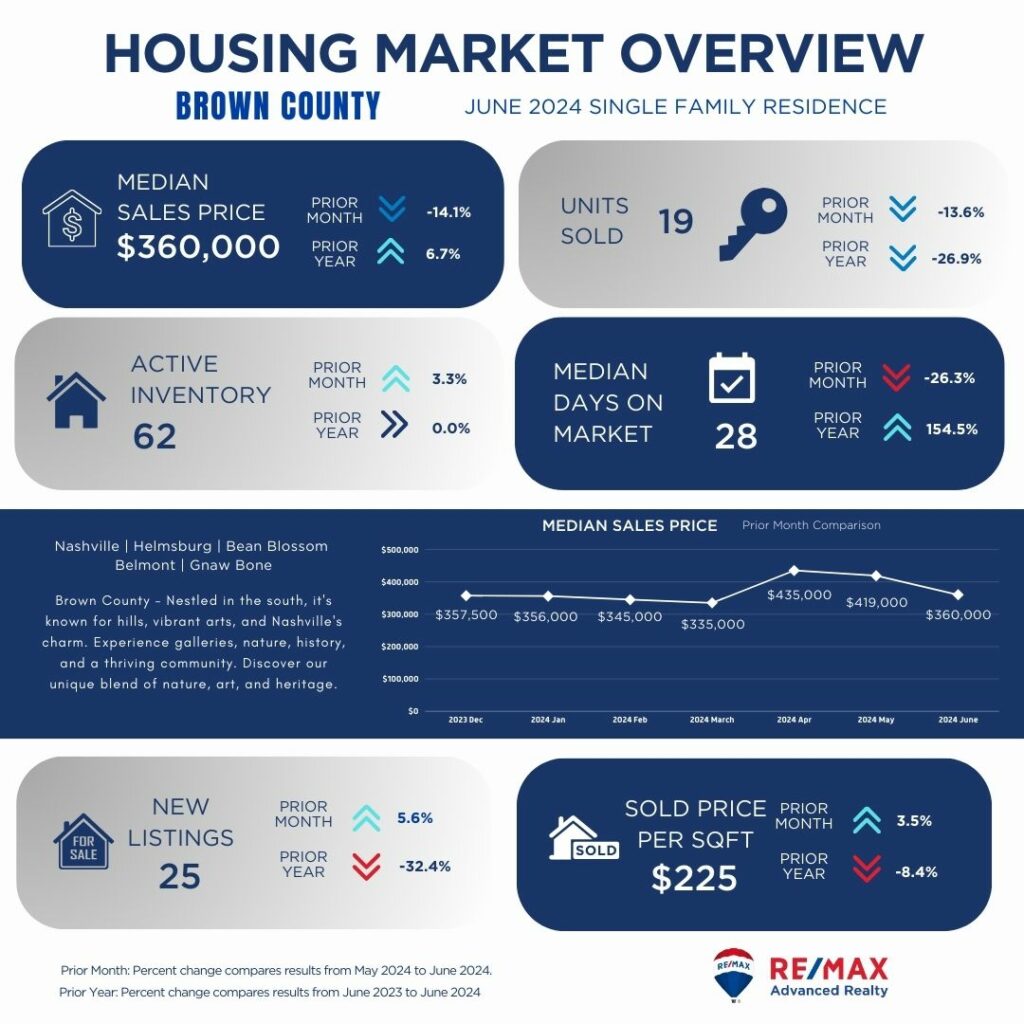
Brown County shows a mixed market with a notable decrease in median sales price compared to the previous month but an increase year-over-year. The decline in units sold suggests a slower market pace, which could provide buyers with more negotiating opportunities despite a stable inventory. Median days on market have decreased significantly, indicating properties are selling faster, but fewer new listings may limit buyer choices. Price per square foot has also decreased slightly, potentially offering buyers more affordable options in this market.
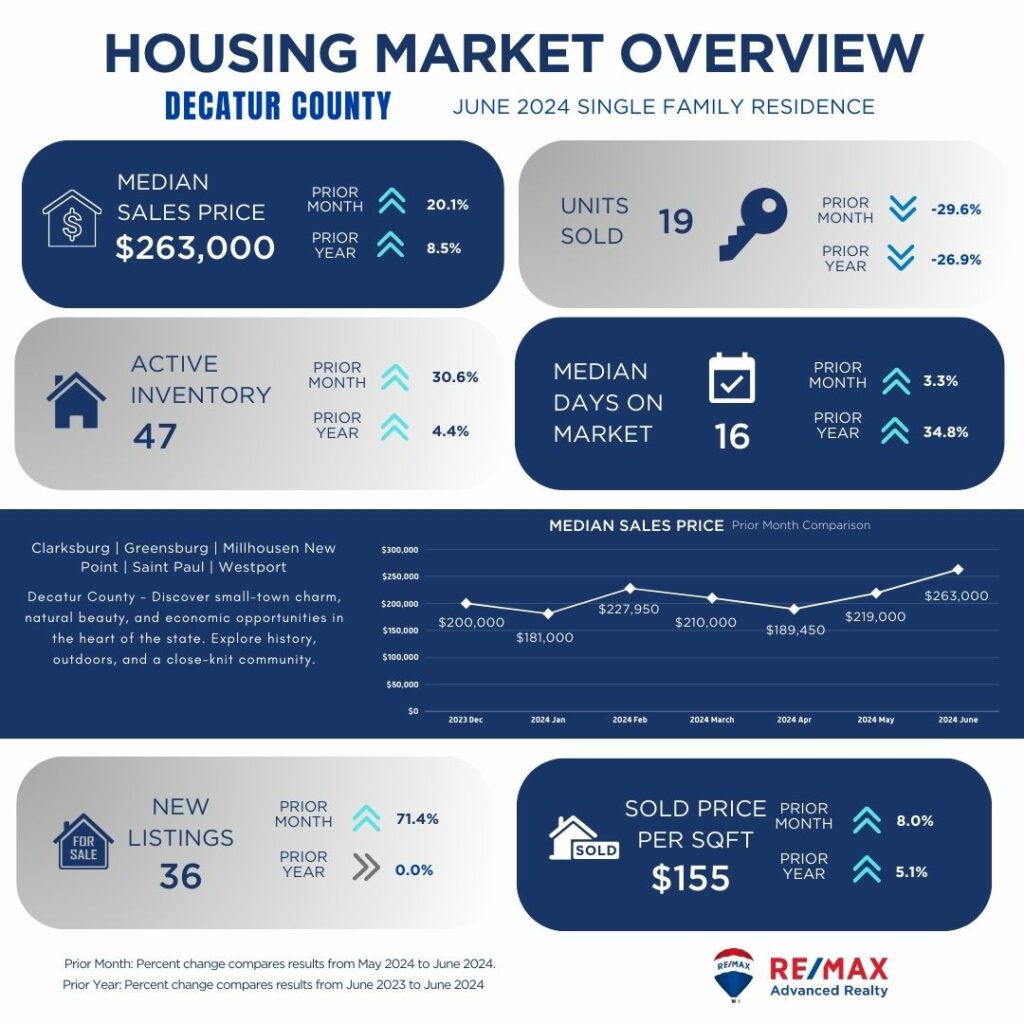
Decatur County displays a strengthening market with a substantial increase in median sales price month-over-month and year-over-year. Despite a decrease in units sold, active inventory has expanded, offering buyers more options. Properties are selling relatively quickly with a low median days on market, indicating strong demand. The increase in new listings further supports market activity, although the rise in price per square foot suggests increasing property values, potentially benefiting sellers.
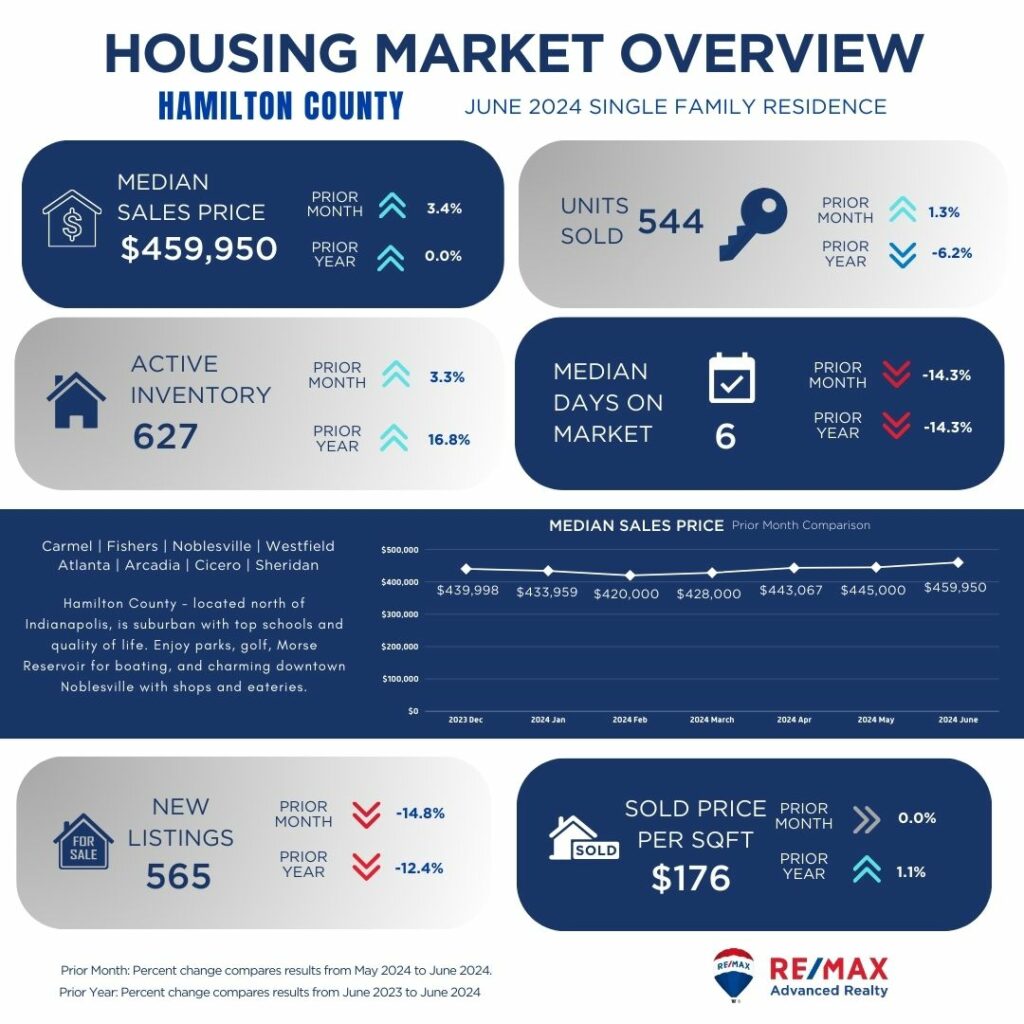
Hamilton County maintains a robust market with a slight increase in median sales price compared to the previous month and stable growth year-over-year. Despite a modest decrease in units sold, active inventory has grown, giving buyers more choices. Properties are selling quickly with a low median days on market, reflecting continued demand. However, fewer new listings may limit buyer options despite a stable price per square foot, indicating a balanced market with steady growth in property values.
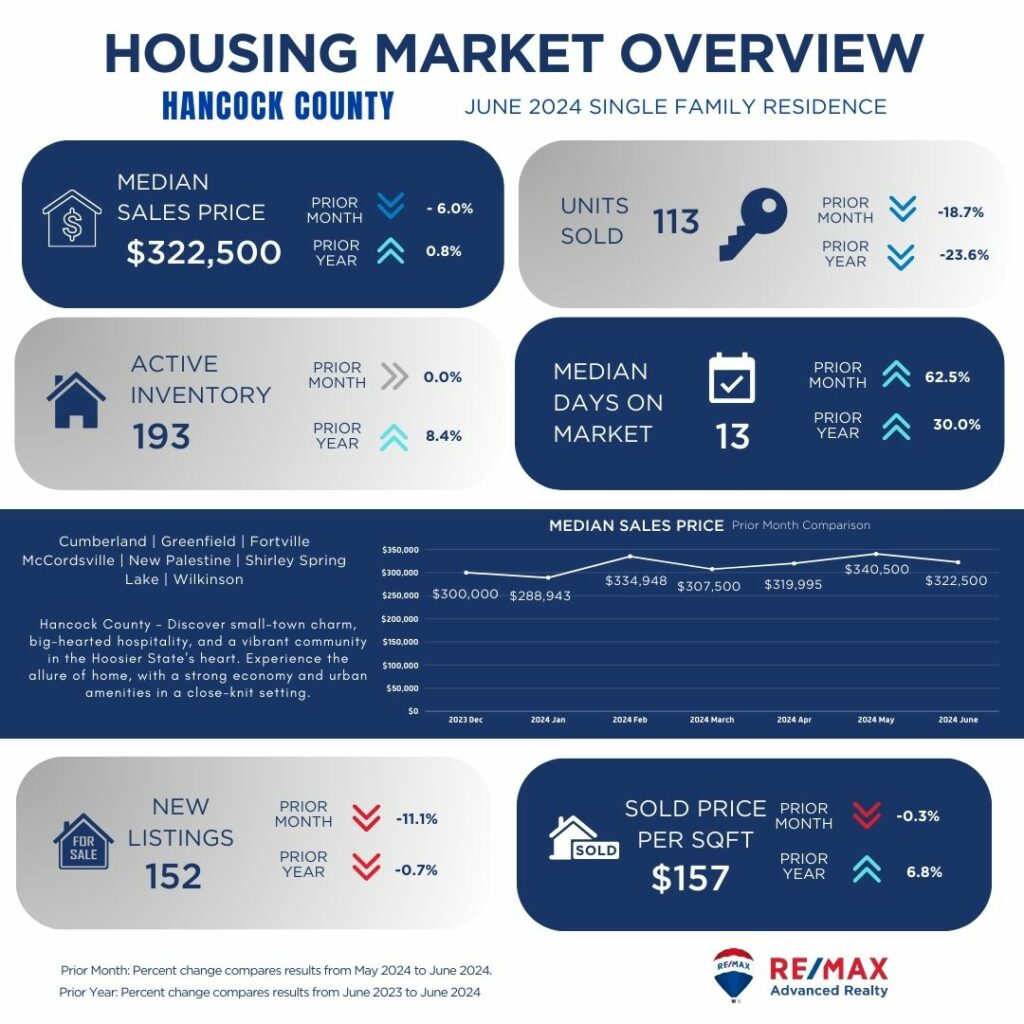
Hancock County shows a steady market with a decrease in median sales price compared to the previous month but a slight increase year-over-year. The decline in units sold suggests a slower market pace, potentially giving buyers more negotiating power despite stable active inventory. Properties are selling relatively quickly with a moderate median days on market, indicating steady demand. Fewer new listings may limit buyer choices, although the slight decrease in price per square foot could offer opportunities for affordability.
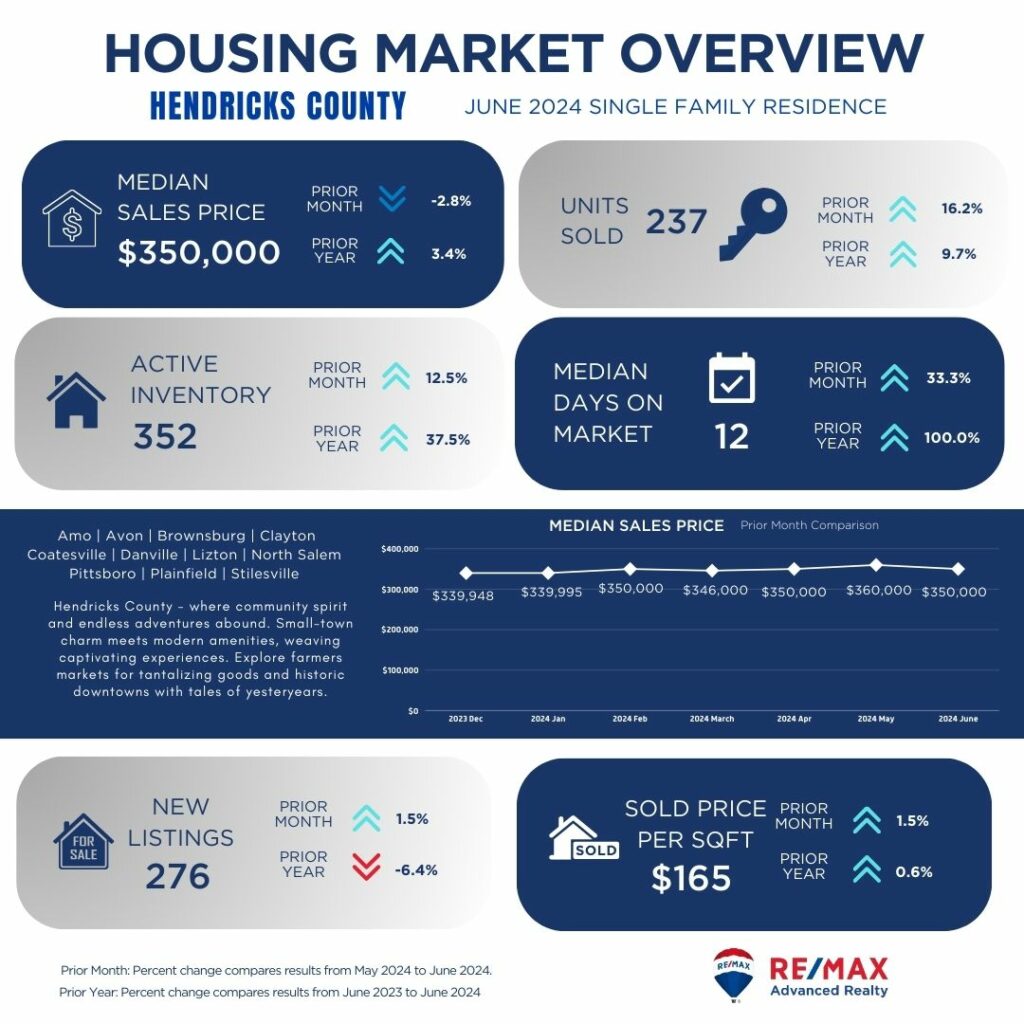
Hendricks County demonstrates a stable market with a slight decrease in median sales price compared to the previous month but a modest increase year-over-year. The increase in units sold suggests continued demand, supported by a growing active inventory. Properties are selling quickly with a low median days on market, indicating a competitive market environment. The slight increase in price per square foot reflects rising property values, potentially benefiting sellers despite fewer new listings limiting buyer options.
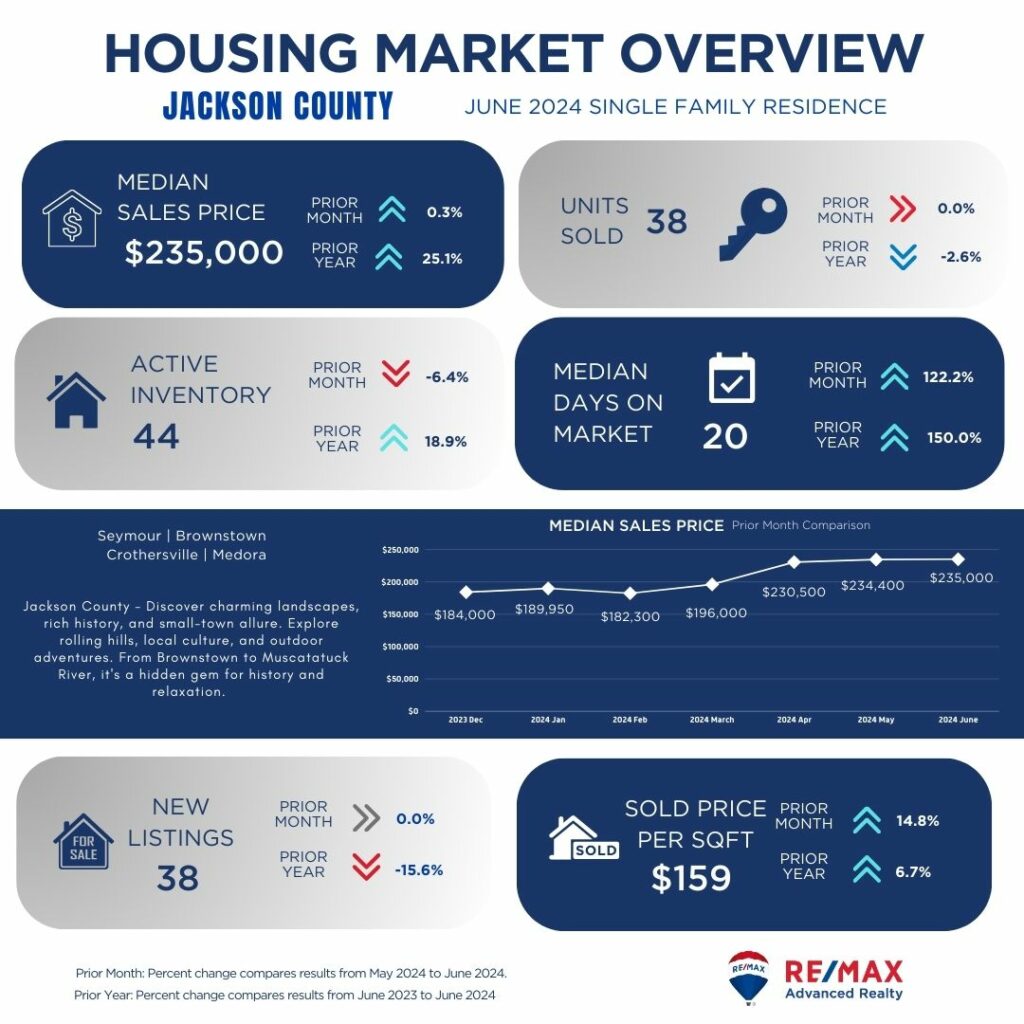
Jackson County shows a resilient market with a stable median sales price compared to the previous month and significant growth year-over-year. Despite a slight decrease in units sold, active inventory has remained stable, providing consistent buyer options. Properties are selling relatively quickly with a moderate median days on market, suggesting steady demand. However, fewer new listings may restrict buyer choices, although the increase in price per square foot indicates rising property values, benefiting sellers.
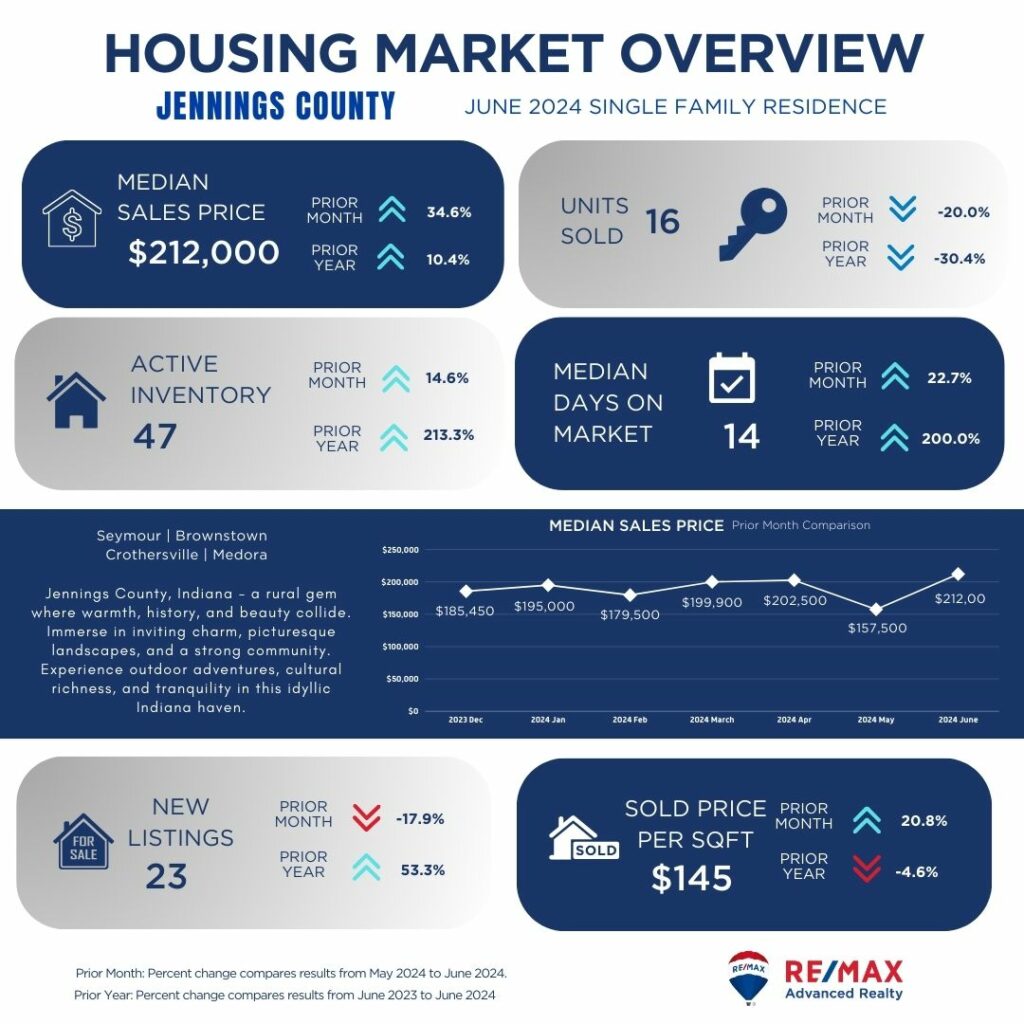
Jennings County displays a strengthening market with a notable increase in median sales price month-over-month and year-over-year. Despite a decrease in units sold, active inventory has expanded significantly, offering buyers more choices. Properties are selling relatively quickly with a moderate median days on market, indicating strong demand. The increase in new listings supports market activity, although the rise in price per square foot suggests increasing property values, potentially benefiting sellers.
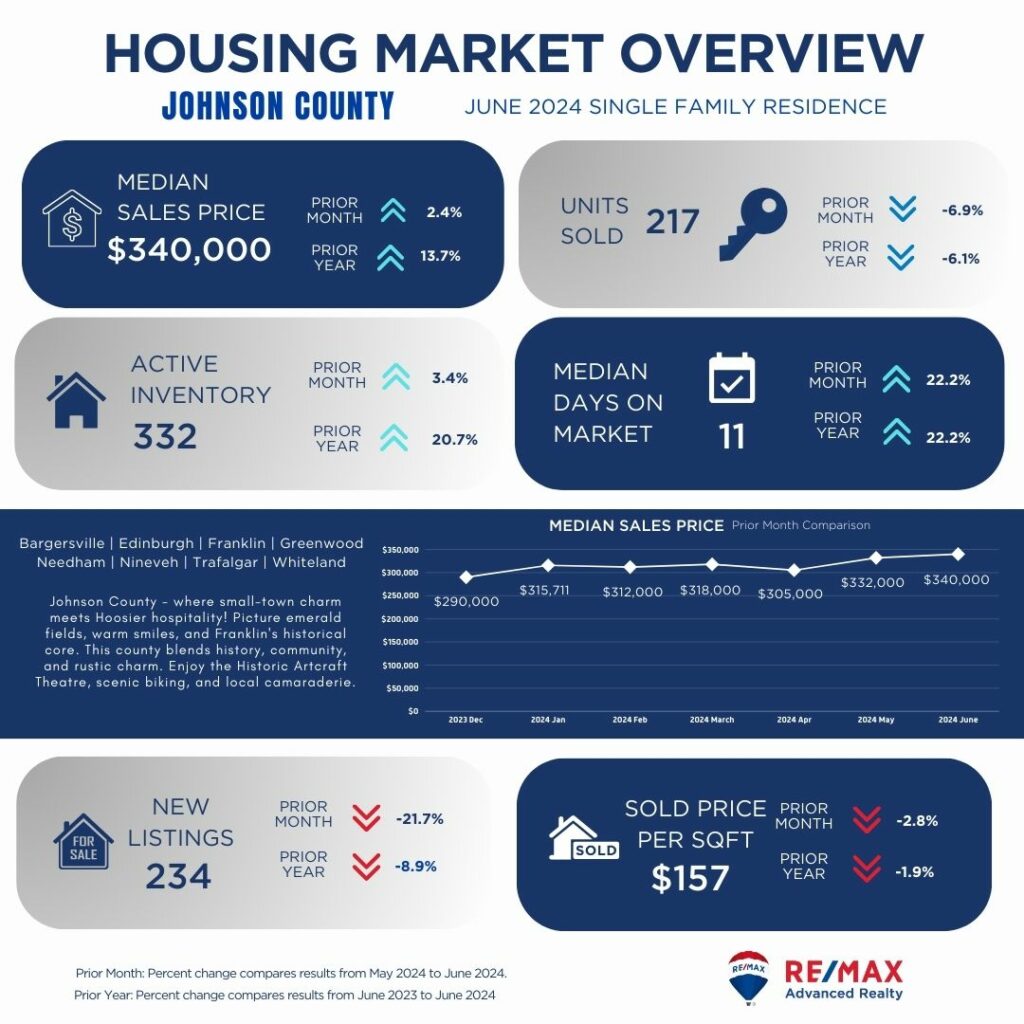
Johnson County maintains a stable market with a slight increase in median sales price compared to the previous month and steady growth year-over-year. Despite a decrease in units sold, active inventory has grown moderately, providing buyers with more options. Properties are selling quickly with a low median days on market, reflecting continued demand. Fewer new listings may limit buyer choices, although the stable price per square foot indicates a balanced market with steady property values.
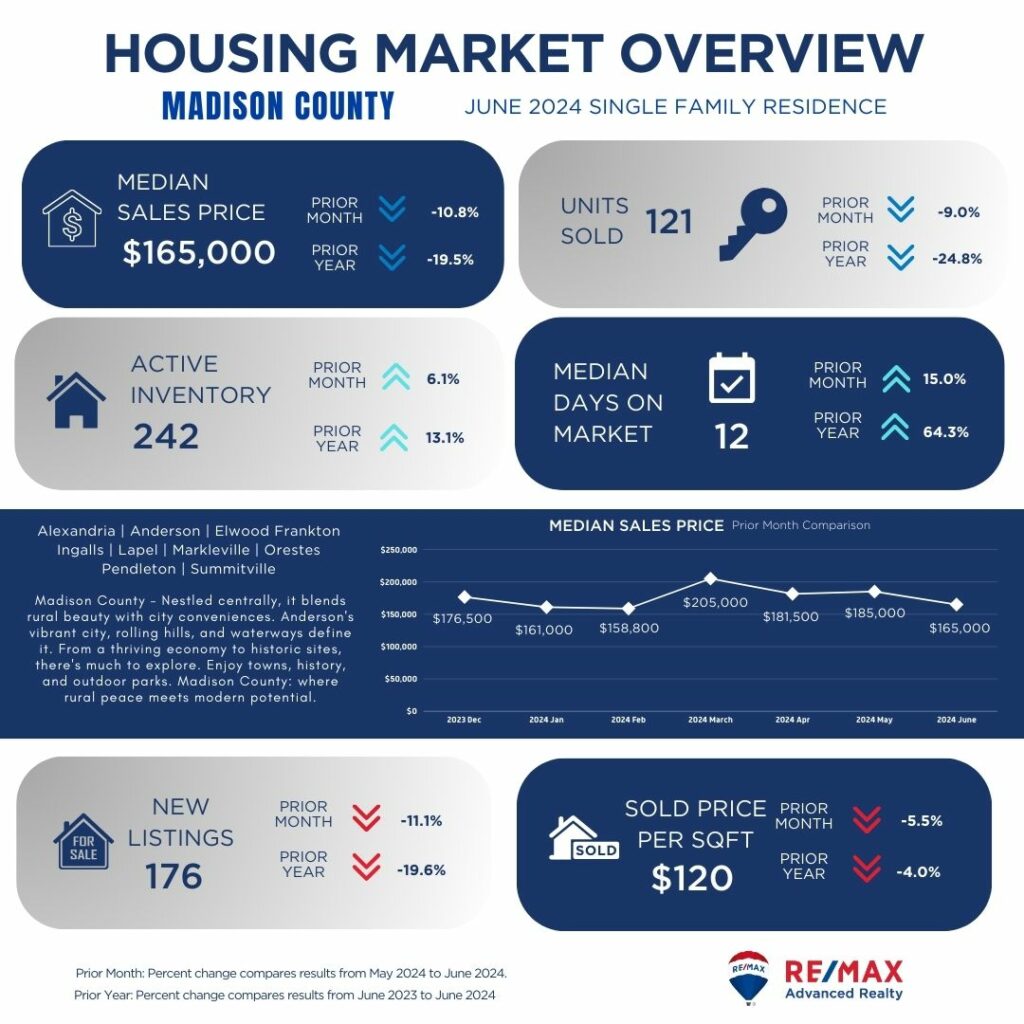
Madison County shows a varied market with a decrease in median sales price compared to the previous month and year-over-year. The decline in units sold suggests a slower market pace, potentially giving buyers more negotiating opportunities despite a stable active inventory. Properties are selling relatively quickly with a moderate median days on market, indicating steady demand. Fewer new listings may constrain buyer options, although the slight decrease in price per square foot could offer affordability in this market.
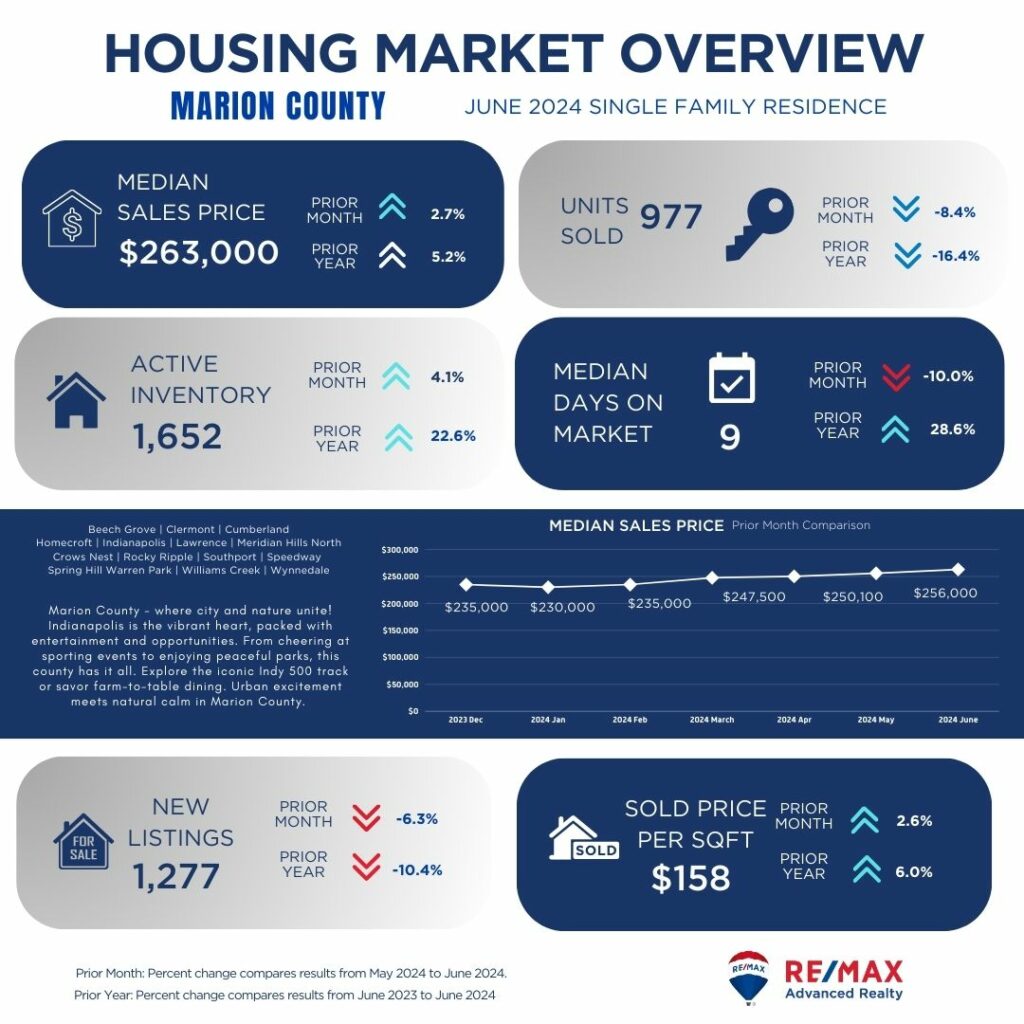
Marion County demonstrates a stable market with a slight increase in median sales price compared to the previous month and moderate growth year-over-year. Despite a decrease in units sold, active inventory has expanded, providing buyers with more choices. Properties are selling relatively quickly with a low median days on market, reflecting consistent demand. However, fewer new listings may limit buyer options, although the stable price per square foot indicates a balanced market with steady property values.
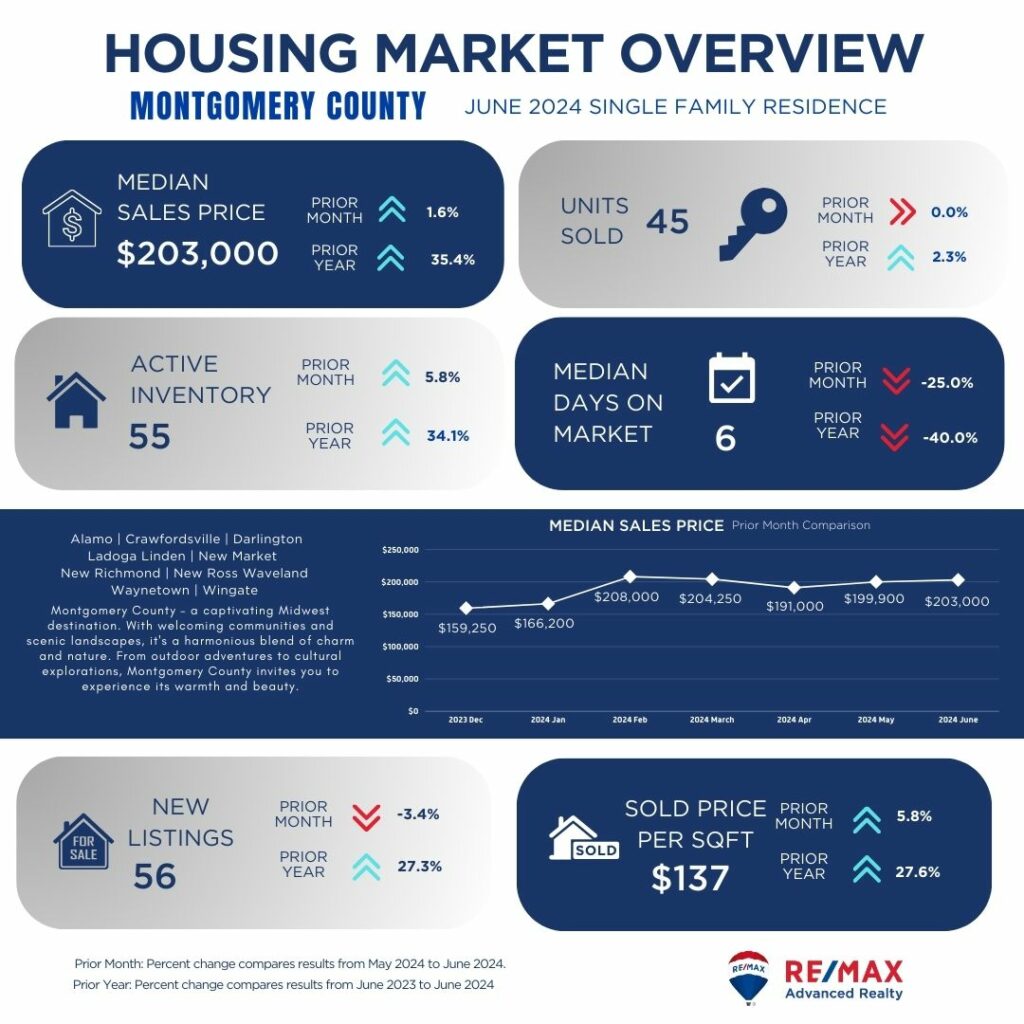
Montgomery County shows a stable market with a slight increase in median sales price compared to the previous month and strong growth year-over-year. Despite a slight decrease in units sold, active inventory has grown, offering buyers more options. Properties are selling relatively quickly with a low median days on market, indicating steady demand. The increase in new listings supports market activity, although the rise in price per square foot suggests increasing property values, potentially benefiting sellers.
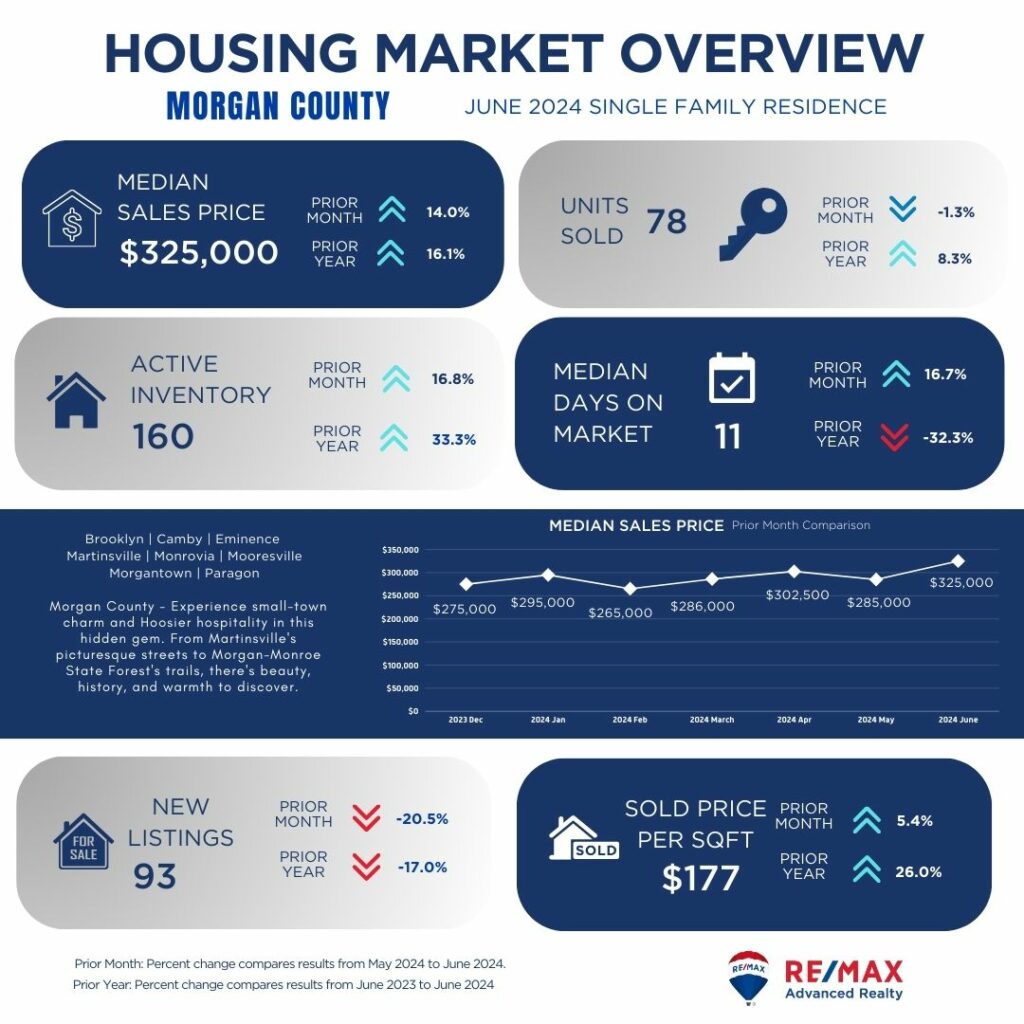
Morgan County displays a robust market with a notable increase in median sales price month-over-month and year-over-year. Despite a slight decrease in units sold, active inventory has expanded, providing buyers with more choices. Properties are selling relatively quickly with a low median days on market, indicating strong demand. The decrease in new listings may limit buyer options, although the increase in price per square foot reflects rising property values, potentially benefiting sellers.
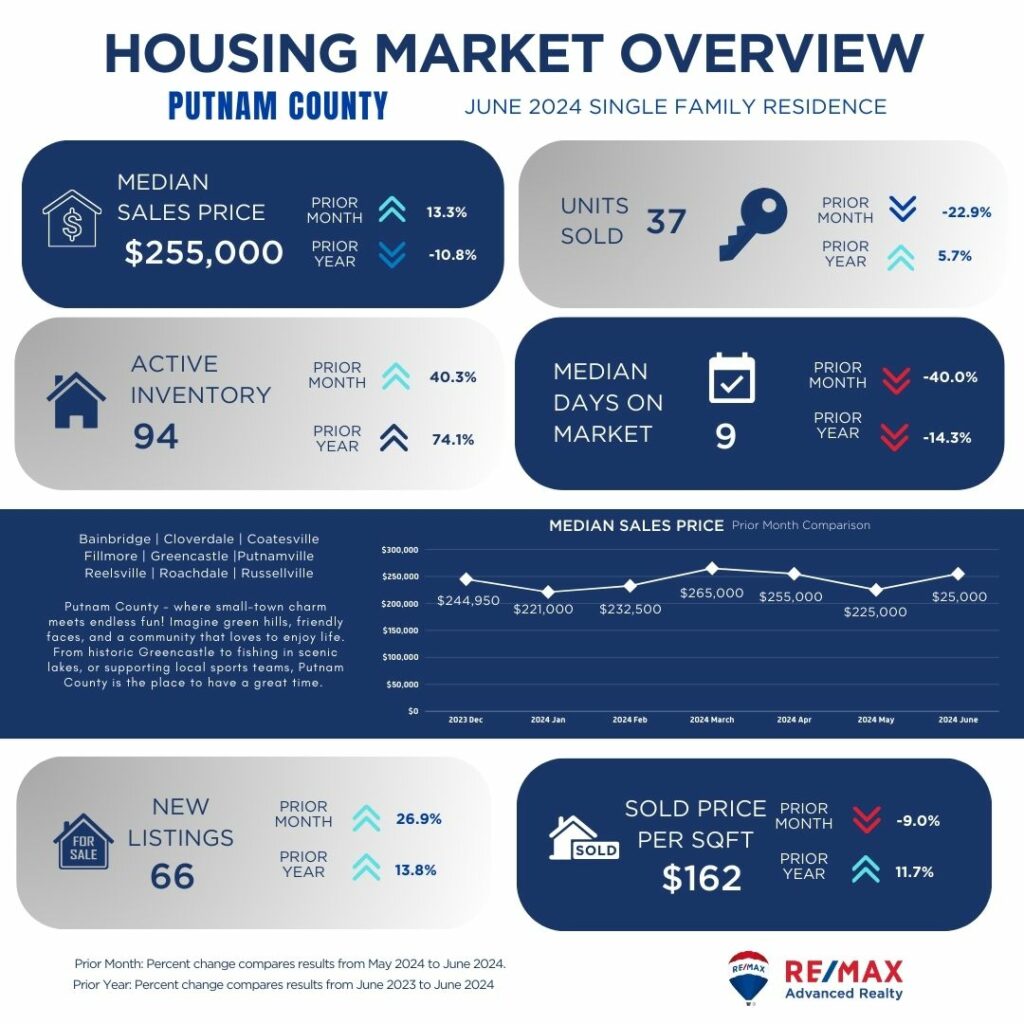
Putnam County shows a stable market with a slight increase in median sales price compared to the previous month and a decrease year-over-year. Despite a decrease in units sold, active inventory has grown significantly, offering buyers more options. Properties are selling relatively quickly with a moderate median days on market, indicating steady demand. The increase in new listings supports market activity, although the decrease in price per square foot suggests affordability, potentially attracting buyers.

Shelby County demonstrates a stable market with a slight increase in median sales price compared to the previous month and moderate growth year-over-year. Despite a decrease in units sold, active inventory has expanded, providing buyers with more choices. Properties are selling relatively quickly with a moderate median days on market, reflecting steady demand. The increase in new listings supports market activity, although the decrease in price per square foot suggests affordability, potentially benefiting buyers.
As we conclude our county-by-county analysis of the Central Indiana single-family homes market, it's evident that each area presents unique opportunities and challenges for buyers and sellers alike. From the rapid pace of Hamilton County to the steady resilience of Boone County and beyond, understanding these trends is crucial in navigating your real estate journey.
Looking ahead, the remainder of the year promises to be dynamic, with shifting market conditions influenced by economic factors and buyer-seller dynamics. Whether you're considering buying, selling, or investing in Central Indiana real estate, our team at RE/MAX Advanced Realty is here to provide expert guidance and support.
Explore our listings, connect with our experienced agents, and let us help you achieve your real estate goals in this competitive market. Contact us today to schedule a consultation and take the next step towards finding your dream home or maximizing your property's value. Trust RE/MAX Advanced Realty for insightful market analysis and personalized service, ensuring a smooth and successful real estate experience.
Are you dreaming of living on your own property?
If yes, you’re not alone.
In our network alone, we know a lot of people who want to have their own home. It’s no surprise though; there are a lot of advantages when you become a homeowner. However, there are several factors to consider while making such a big decision. So before you choose a new home, be sure to read this post first.
In this article, we will talk about what problems to look for when buying a house. From structural issues to hidden flaws, knowing what issues to check can save you time, money, and headaches.
Before rushing into something, especially one that’s as huge as buying a home, it’s important to thoroughly inspect it. Some of the problems include:
When a door refuses to close, it's likely because the frame has moved and the door is no longer square. To get the door to close in certain cases, the homeowners might have chopped a small piece from the door. Therefore, be cautious if you see some trim removed from its top or bottom. Although the door may shut correctly, the issue that caused the shifting still persists.
The majority of poured concrete foundations will eventually develop hairline fractures, although they are not a sign of an issue. However, it's a good idea to have a foundation contractor look at the region if a crack is bigger than 1/2 inch. This also applies to cracks that seem to have been fixed lately. Large fissures may be a sign of a shaky foundation.
While most mold isn't as dangerously deadly as, say, Stachybotrys, breathing in mold spores can cause headaches, respiratory ailments, and other ailments. Additionally, mold growth may be a sign of structural issues with a home. If you detect the smell of mold, look for leaks in crawl spaces and basements, under sinks, and around windows. Wood members, drywall, and carpets are examples of construction materials that may need to be replaced if a leak has been present for a long time.
It is advisable to identify the symptoms prior to making an offer because the existence of live termites has the potential to jeopardize a housing contract. Little mounds of microscopic brown droppings on the ground close to a wall are one obvious sign. Additional indicators include the sound of hollow wood and the existence of mud tubes on a foundation. Because termites reside underground, they dig tiny mud tunnels along walls and foundations to shield themselves from sunlight while they go from their underground nests to the wood they are eating.
Building supplies and water don't mix. Over time, the slow leakage of water from a window or roof can cause structural wood members to deteriorate. Water stains that have a brown or yellow tint could indicate a plumbing issue on a higher floor. Don't make an offer until you have an idea of the source of the leak and the extent of the harm it has caused.
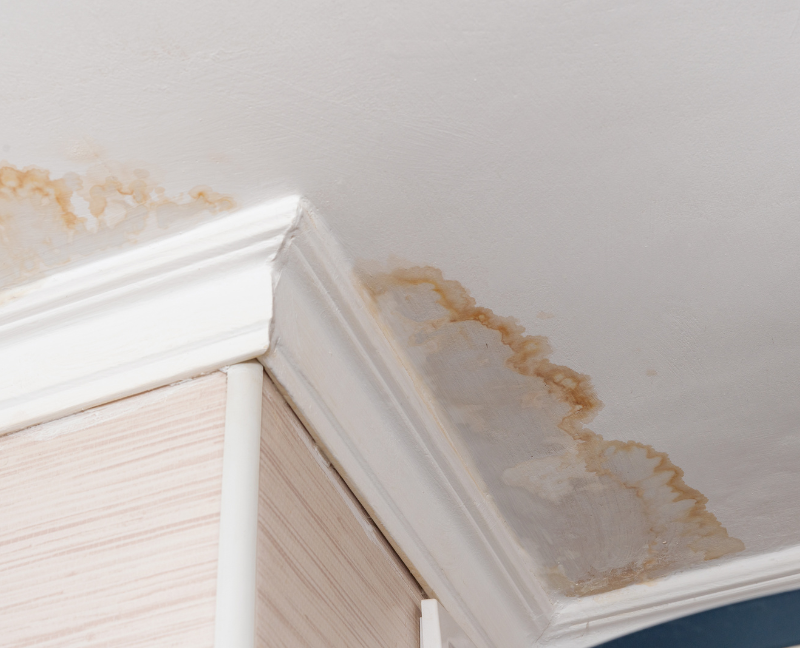
No matter how charming and comfortable the home is, a drooping ceiling is a cause for concern. Even a small amount of sag in the ceiling can indicate a structural movement that is causing the drywall to come free from the ceiling joists, an insect infestation that is gnawing away at the joists, or a roof leak. Whatever the reason, the cost of repair may be high.
Put this one firmly under the category of "buyer beware! While many individuals are competent at doing small repairs around the house, very few are qualified to build an addition that complies with building requirements. An addition constructed by the homeowner without the local building authority's supervision may have structural, electrical, and plumbing flaws.
Not every fresh coat of paint signals a problem. Actually, before offering their homes for sale, sellers frequently paint the walls a fresh coat. However, if fresh paint appears out of place, as in a room where only one wall has been painted, you should question its application. Spot painting may be an indication that the seller is attempting to hide a wall flaw, like a water stain.
The homeowner may be attempting to mask the smell of something else, such as pet urine-saturated carpeting or mold growing beneath the sink, if you walk into a house and are immediately hit by a strong scent of air freshener or if essential oil diffusers are steaming away in every room. urge for a second showing and urge the seller not to use air freshener before you come if you're interested in the place.
A yard should slope away from the home by at least 2 percent in order to keep water away from the foundation wall. After it has rained, drive by the house you like. Puddles of standing water could indicate a drainage issue in the yard. The most dangerous puddles are those that are close to the foundation since even the smallest crack might allow water that flows along a foundation wall to seep into a basement.
While the typical AC unit lasts 10 to 12 years, furnaces typically last 15 to 18 years. HVAC (heating, ventilation, and air conditioning) units lose efficiency as they get closer to the end of their useful lifespan. Because of this, operating them will cost you more in energy expenses, and they might not adequately heat or cool the house. Additionally, there's a potential that one or both of them will completely stop functioning, in which case you'll have to pay to replace them.
The most crucial consideration when purchasing a home is, as real estate brokers like to say, "location, location, location." If a number of properties in the neighborhood are for sale, this may be a sign of a problem with the location, such as an increase in crime or a proposed landfill nearby. Include investigating the community as a regular aspect of your house search.
It pays to properly inspect the roof because replacing a roof is an expensive project that can cost anywhere from $6,000 to $20,000 or more, depending on the size of the roof and the type of roofing materials used. The roof may need to be replaced if there are any of the following symptoms: exposed nail heads, missing or broken shingles, or shingles that curl up at the corners. A roofer with experience will be able to confirm.
Some sellers offer their properties "As Is" for good reason—they just don't want to deal with potential issues that could come out during an expert inspection. In essence, they are saying that they will not foot the bill to address any issues that arise. You can still have the house inspected, which is a good idea, but if the inspector discovers mold, termites, or other issues and you decide to move forward with the purchase, you will be responsible for paying for any repairs
A house's duration on the market before it sells might vary depending on a number of factors, but the average period from listing to closure is 68 days, according to real estate expert Zillow. In general, steer clear of a house that has been on the market for months or years; speak with a real estate agent about the typical time in your neighborhood. There's a good chance it has undiscovered issues that would be costly to fix.
Examine the underside of the roof eaves (the soffits) from the outside of the house. One or more intake vents should be visible to you. Extra exhaust vents ought to be placed at the top of gable walls, on the face of the roof close to the ridge, and along the roof's ridge. An attic's decking (or roof sheathing) and shingles themselves may sustain damage in the summer heat if there is insufficient ventilation.
During an open house, potential buyers try to determine whether a house is a good fit for them by asking questions such as "Is the kitchen large enough?" or "Does it have enough bedrooms?" Do the bathrooms require remodeling? However, it's important to remember that a home must do more than merely fulfill a list of requirements. Ultimately, for the majority of people, it represents their largest investment yet. It needs to be in good shape as well.
The usual listing contract contains a disclosure form where the seller is required to detail all known problems of the house in order to aid potential purchasers in assessing the condition of a property. However, it's possible that not all of the flaws are disclosed by the seller, and some sellers may purposefully leave out issues in the hopes that you won't see them. Click through to discover some frequent warning signs that should cause you to reconsider your purchase in order to avoid unforeseen maintenance costs.
Before you jump to make an offer on a house that is priced much below market value, find out why. If the septic system overflows the day you move in and raw sewage fills your shower, you won't be getting a great deal. Often, really cheaply priced homes have costly issues that need to be fixed. To ensure that you know exactly what you're receiving before you buy, take the time to employ experienced inspectors.
Purchasing a home through a for-sale-by-owner (FSBO) may seem like a great way to save a few thousand dollars in agent costs, but you may wind up having more difficulty than you anticipated. Because real estate transactions are complicated, you risk purchasing a home with significant issues with the deed or the construction if you don't have an agent to walk you through the process. Make sure you speak with a real estate attorney before placing an offer on a for sale by the owner (FSBO).
Floors that are slightly uneven can be attributed to normal settling, but if the slope is apparent, it may indicate a foundation issue, a damaged floor joist, or rotten support beams. If there are one or more sloping levels in the house, it makes sense to have a structural engineer inspect the property because fixing structural issues can run into thousands of dollars.
Inspecting a home thoroughly might sound like a daunting task; however, spending enough time to look for issues can save you from high expenses and stressful situations.
Whether you're buying your first house or your third, purchasing real estate will always be stressful. Why? Because there will always be a challenge in the real estate market, such as home prices that are beyond reach, increased mortgage rates, and a shortage of inventory.
Knowing what is ahead and surrounding yourself with experienced individuals who can offer guidance are the keys to making it less frightening.
In recent years, there has been a great deal of fluctuation in the property market. If you're attempting to purchase a property, it's crucial to understand the current status of the housing market since it will affect your capacity to make a successful bid. That said, before you start your journey to buying a home, take some time to educate yourself about the current state of your local market.
A rise in the supply of homes would lessen the pressure on home prices to rise by counteracting the demand from buyers. In addition to lowering the entire upfront costs, a lower home price may also result in a cheaper mortgage payment.
List the things you need and want in your dream home as well as the community you want to live in so you can focus on your search.
Use reputable real estate websites, such as Realtor.com, Redfin, Zillow, RE/MAX, and Trulia to get a sense of the kind of homes that fit your requirements. Take note of the home prices to see if they are within your means. If not, you might have to narrow down your search parameters or make some compromises.
One of the largest financial commitments you will ever make is purchasing a home, so before you start looking at properties, keep your finances in order.
Understand your current financial situation. To assess whether you can afford to make monthly mortgage payments, mortgage lenders will examine your cash reserves, income, and debts as well as obtain a copy of your credit report. A FICO score of 620 or above is typically required by lenders to approve a conventional loan.
You may check your credit report for free from each of the three major credit reporting bureaus: Equifax, TransUnion, and Experian every week at AnnualCreditReport.com. Requesting reports from each agency is a good idea, and you should carefully check over them as there may be inconsistencies or errors in the material.
Look for local real estate brokers and arrange for introductory calls or meetings. It's a good idea to interview a few and choose the agent that is educated about the area you're looking to buy into and suits your personality and communication style. A good real estate agent will assist you learn about the home-buying process, highlight discrepancies between pricing and expectations, and provide you with previously unconsidered information.
Don't just get prequalified, get pre-approved. What's the difference, you ask?
A mortgage pre-approval is a comprehensive process where a lender verifies financial information, such as W-2s, tax returns, pay stubs, assets, and credit to determine what loans you could be approved for, the amount you can borrow, and what your interest rate could be. Prequalification is more similar to an approximate estimate of what you can borrow. This might assist you in determining how much you can pay and show home sellers your seriousness about making the purchase.
In difficult economic times, having a solid credit history and financial profile is especially crucial, as lenders are less inclined to take on customers who pose a larger risk of loan default.
Along with encouraging you to search online for additional properties you might be interested in, your real estate agent will probably show you listings that fit your needs and budget. Although in-person tours are preferred by most buyers, if you are unable or unwilling to see the property, you can still obtain a virtual tour.
No matter what you choose, virtual or personal home viewings, start looking early to stay ahead of the competition. Once the prices decrease, home buyers will start to go out, look for homes, and close deals if you haven't started yet, someone else might have the home you always wanted.

It's time to discuss placing an offer with your agent when you've located the place you want to call home.
To help you decide how much you think the house is worth, check the sale prices of nearby comparable homes that have previously sold. A list of real estate comparables (comps) that illustrate the prices paid by buyers for comparative, previously sold properties in the same neighborhood can be compiled by your agent. This may help you determine the appropriate amount to offer.
When you submit your offer, the seller has three options: accept, reject, or counter. During the pandemic, buyers could not afford to negotiate and sellers maintained control. The good news is that the market is currently somewhat more balanced now compared to the previous years.
Buyers can bargain more to get the best deal possible within their budget, but note that the price of the listings—especially the expensive ones—determines the outcome.
Earnest money is deposited with a third party, such as a real estate broker, law firm, or title business, once your offer is accepted. This money is kept in escrow until closing and can be used toward your down payment or closing fees. Known as a good faith deposit, earnest money signifies your seriousness as a buyer and is often between 1% and 5% of the total cost of the home.
Now that the sale is on hold, it's time to start the due diligence procedure, which includes the home inspection. A house inspection is a qualified inspector's visual evaluation of the property's condition, and the results can assist buyers in making better decisions.
If your purchase offer contains a condition for a house inspection, you may choose to walk away from the deal entirely or bargain for repairs.
You should submit your mortgage application as soon as possible after you get into a contract. Choose a lender who best meets your needs by shopping around and comparing mortgage offers. Your interest rate and the amount you qualify for will be estimated by your lender.
After you're pre-approved, your lender might also provide you with a mortgage rate lock, which is normally good for 60 days or occasionally longer. When interest rates are expected to rise, a rate lock is an excellent idea. However, you cannot simply switch to a lower interest rate if rates fall.
To make sure the agreed-upon sale price is equal to the property's market value, your lender will usually need an appraisal of the asset. The appraisal is frequently included in the overall amount of closing expenses for a house.
A few days before closing, conduct a final walkthrough. This will help you verify that the house is in good condition and/or in the same condition as when the offer was made. For homes that have issues, this will also help confirm if the agreed repairs have been made.
The actual closing process is quite simple and calls for signatures attesting to the ownership transfer. Depending on your state, you may sign documents in person with a representative of your title insurance firm or electronically, if that is permitted.
The actual closing procedure only requires signatures attesting to the transfer of ownership and is rather straightforward. You may sign documents electronically if allowed by your state, or in person with a representative of your title insurance company.
We hope that we've helped you understand the process you need to go through when buying a home. As always, our team at RE/MAX Advanced Realty is here to help. Just send us a message or leave a comment if you have questions about purchasing a property.
Being in the real estate industry for more than 20 years is both an exciting and challenging experience. There are many wins -- and by that we mean helping tons of clients find their dream homes and sell their properties at the best prices.
There are also times when we wish we could have done something better, and while these are times we, well... felt bad, we know these are crucial because these instances helped us learn. For instance, securing a client their dream home in a low inventory market required a strategic approach and dedication to their specific needs.
Below, we’ll share how we’ve accomplished it.
We started by thoroughly understanding our client's requirements, preferences, and budget constraints. This allowed us to narrow down the search and focus on properties that truly matched their criteria.
In a low inventory market, being proactive is key. We constantly monitored new listings and were quick to schedule viewings as soon as suitable properties became available.
We took advantage of our wide network and connections within the real estate industry.This gave us access to off-market listings and potential sellers who were considering listing their homes.

With limited options available, negotiation skills were crucial. We utilized creative negotiation tactics to make our client's offer stand out, whether it was offering a competitive price, flexible closing terms, or demonstrating our client's strong financial position.
Keeping our client informed about market trends and insights was essential. This helped manage expectations and make informed decisions quickly when the right opportunity arose.
Patience and perseverance are frequently needed to secure a dream house in a market with low inventory.We remained committed to our client's goal and continued the search until we found the perfect match.
When it came time to make an offer, we strategically positioned our client to make a compelling bid without overpaying. This involved analyzing comparable sales data and assessing the current market conditions.
Along the process, from the first search to the closing, we gave the client constant guidance and support. This made the transaction successful and seamless.
By combining these strategies and our expertise in navigating low inventory markets, we were able to secure our client their dream home, exceeding their expectations and delivering an exceptional real estate experience.
There is a growing need for eco-friendly, energy-efficient homes in this era of increased environmental consciousness. More and more purchasers are looking for properties that support sustainable and healthy living, are in line with their values, and provide long-term cost savings. Fortunately, building environmentally friendly, energy-efficient houses is now simpler than ever, thanks to technological developments and building techniques.
In this post, we'll understand the benefits of living in an eco-friendly home as well as its positive effects on both the homeowners and the environment.
Eco-friendly properties are mainly about creating a positive impact on the environment, but other than that, it's about aesthetics.
They contribute to reduced carbon emissions, conservation of natural resources, improved air and water quality, and preservation of biodiversity. Using renewable energy and energy-efficient technologies, eco-friendly properties play a significant role in minimizing climate change.
Additionally, eco-friendly properties conserve resources. Installing water-saving fixtures, rainwater harvesting systems, and energy-saving appliances saves up to 30% and 20-30%, respectively.
Eco-friendly properties also prioritize air and water purity. They improve indoor air quality and discharged water with modern ventilation, air filtration, and wastewater management systems.
The use of sustainable landscaping and green spaces in eco-friendly properties promotes biodiversity. Urban ecological equilibrium is maintained by native plant species and rooftop gardens.
Overall, environmentally conscious homebuyers seek eco-friendly properties due to the growing focus on sustainability. They are a good investment for a cleaner future because they cut carbon emissions, conserve resources, enhance air and water quality, and preserve biodiversity.
Eco-friendly properties boost the real estate industry financially and environmentally. These homes serve as great investments by helping owners save money on energy.
Solar panels, LED lights, and smart thermostats can reduce electricity costs in eco-friendly dwellings by 30% or more—your ethical investment in a sustainable future rewards you with financial security.
Eco-friendly homes and appliances qualify for tax breaks, and renewable energy technologies like solar panels receive financial incentives. Due to limited supply and rising buyer demand, these homes may command a 10% premium above conventional residences, delivering significant returns on investment.
Due to their durability and sustainable materials, eco-friendly properties require less maintenance and repair. This saves money on maintenance over time, making such homes financially beneficial. That said, buying eco-friendly properties benefits both the environment and the wallet.
Aside from creating a more appealing and healthy living environment, they provide homeowners considerable health advantages.
Here are the benefits of eco-friendly properties on health:
Pollution and insufficient ventilation cause poor indoor air quality in conventional dwellings. Eco-friendly properties reduce dangerous pollutants by using low-VOC materials and modern ventilation systems. Air filtration systems in these properties remove allergens, dust, and other contaminants, improving indoor air quality.
Eco-friendly homes use non-toxic materials during construction. They avoid formaldehyde, lead, and asbestos. Rooftop gardens and native plant species preserve urban ecological balance. Non-harmful materials eliminate the risk of long-term health concerns and allergies associated with conventional dwellings.
Comfort and well-being are prioritized in eco-friendly properties. Improving insulation, soundproofing, and natural illumination makes life more comfortable. Eco-friendly features also encourage natural and biophilic design, which reduces stress, boosts productivity, and improves health.
Eco-friendly properties conserve resources, reduce carbon footprints, improve air and water quality, and preserve wildlife. They also provide energy savings, tax benefits, property value increases, and long-term maintenance and repair savings.
The above information can answer why eco-friendly properties are the best option for buyers. Buyers should explore green investments due to their advantages and growing sustainability interests. Eco-friendly homes save money, the environment, and health.
One of the most important phases in the home-buying process is closing because it's at this point that the buyer and seller exchange possession of the property. Unless they are performing a dry closing, the seller will often get payment for their house.
When a real estate closing is finished without any money being transferred—including closing costs—it is referred to as a "dry closing." Generally speaking, when the funds are approved but non-transferable, dry closings expedite the closing process for a home or property.
A dry closing will be started by the seller or the buyer, and it commonly happens when the funds are delayed. For instance, the buyer may still need to fulfill a last requirement, which could take some time to accomplish, even though the money for the mortgage has been authorized.
Alternatively, there can be a problem with the property that the seller is attempting to resolve. The buyer and seller decide on a dry closure as an alternative to postponing or canceling the transaction.
A wet closing involves paying the money for the sale of the house all at once and completing the real estate deal. Every real estate contract is signed, and the money is distributed right away. All 50 states allow this kind of closing, which is the most popular.
A dry closing, on the other hand, allows the buyer and seller more time to finish the real estate transaction. They proceed through closing, but until the money is sent, the deal isn't finished. Furthermore, a dry closing is only permitted in some states.
These are the states that allow dry closing:

There are times when a dry closing is more convenient for all parties. However, consenting to a dry closing entails a certain level of risk. This could consist of:
Is it ever a good idea to have a dry closing, assuming that's legal in your state? Perhaps, in light of your circumstances. Dry closings are a way to keep the real estate deal going forward in the event of problems.
Accepting a dry closing offers the lender an extra few days to smooth things out if the money transfer is taking longer than anticipated. Please ensure that you understand the dangers before consenting to a dry closing.
There's no guarantee that the real estate deal will fail if you're contacted regarding a dry closing. In fact, a dry closing can keep things going so that everyone concerned gets what they desire. However, you have to understand what it really means first, what to expect when you choose it, and if it’s the right choice for your situation.
"Make money buying real estate."
"Now's the best time to buy a home."
"Buy houses for pennies on the dollar."
These are the kinds of remarks that people typically relate to foreclosures on real estate. In reality, foreclosures on real estate rarely result in instant financial success. Of course, there are great deals to be taken advantage of but still, it's not gonna offer easy money to anyone. Nonetheless, you can get those possible benefits through a lot of effort and devotion.
In this post, we'll answer the following questions:
What does foreclosure mean?
What are the pros and cons of buying a foreclosed property?
What are the steps in buying a foreclosed property?
So without further ado, let's get started.
Homeowners rarely buy a home outright or in cash. To finance the purchase, they typically obtain a mortgage from a bank or other lender. After that, it is the buyer's responsibility to pay the lender on time.
However, buyers occasionally miss these installments. The University of Illinois lists the following as typical causes:
Divorce resulting in financial strain
Huge medical expenses, especially when the homeowner is uninsured or underinsured
Death of the primary income earner
Loss of source of income (example: job or business)
Liens are legal devices included in all mortgage transactions. The lender's monetary interest in the house is safeguarded by a lien. If the borrower defaults on the loan, it enables the institution to take possession of the asset.
Banks typically assist financially troubled homeowners in attempting to resolve their issues. If those don't work, the bank will use the mortgage contract's lien to foreclose on the house and seize possession of it.
The bank will then either sell the house directly or put it up for auction. There are situations where the present owner will close a short sale. Through this procedure, a buyer can purchase the house at market value, even if that sum is insufficient to pay off the remaining mortgage balance.
Now, the event where the lender or the banker seizes the home, that's is called foreclosure.
Buying a foreclosed home has the following advantages:
Without a doubt, foreclosures typically come with a lower price tag or are priced below market value than other types of real estate. This is because the lenders who set their prices just want to get rid of the property faster.
Compared to regular residences, foreclosure properties may have a different bidding and purchasing procedure. But if the property isn't being sold in a cash-only auction, you might be able to get a loan to buy a foreclosed home.
One may obtain a traditional loan or one backed by the government through the Department of Veterans Affairs (VA), Federal Housing Administration (FHA), or S. financing from the United States Department of Agriculture (USDA) if the house is livable.
Lending secured by the government helps lower the cost of becoming a homeowner. However, the property needs to match the loan's minimal property requirements to be eligible for the loan.
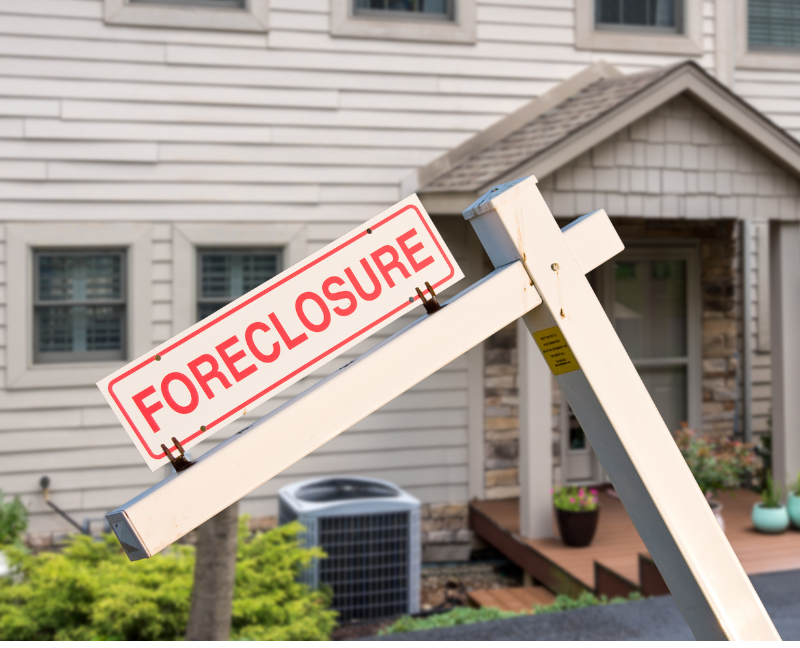
Buying a foreclosed home has the following disadvantages:
There might be a chance that the foreclosed home you're buying has been neglected by its former owners. If that's the case, you might need to not only check the problems but also, spend money to fix them.
Take Note: The primary goal of the lender is to get their money back as soon as possible, which nearly always entails an as-is selling.
If you don't have a lot of money to spend on repairs, you shouldn't purchase a foreclosure.
Just because a house is foreclosed upon legally does not mean it is abandoned. Squatters may be drawn to foreclosed properties since they are sometimes vacant for months or even years. You have the right to evict a squatter who occupies the house if they do. However, evicting them may not be easy. Sometimes, it might take months to complete the eviction and you have to spend thousands of dollars for legal costs.
Here are some questions people commonly ask before purchasing a foreclosed property:
Purchasing a repossessed property comes with risks related to neglect, damage, and property degradation. On the other hand, buying a foreclosed home is beneficial since it lets you save money because you are getting the house at a reduced price.
When determining whether a foreclosure is the best option for you, consider your financial circumstances and ability to make repairs. Because the property might require more work than you anticipated, weigh the risks involved in your investment. Consider all the options carefully before determining if purchasing a foreclosed home is a wise move for you.
Whether purchasing a foreclosed home is a wise investment depends in part on your real estate investing objectives.
For those looking to purchase a home at a reduced price or below market value or keen to restore and customize a property, purchasing a foreclosure may present a special opportunity.
However, you should also consider the disadvantages it might have, such as the amount you might spend fixing the property.
Nonetheless, knowing whether it's the right property for you or not depends on your real estate goals and circumstances. If you decided to pursue a foreclosed property, we’ve written a detailed guide on what to expect when buying a foreclosed home.
No-wake lakes in Indiana offer peaceful boating for water enthusiasts. Flint Lake, Lake of the Four Seasons, and others have "no-wake" policies to keep boat speeds low for kayaking, paddleboarding, and fishing.
The limits protect the ecology, reduce shoreline erosion, and provide a peaceful setting for residents and visitors to enjoy the scenery and pleasure without high-speed watercraft.
The calm charm and conservation efforts of Northwest Indiana's no-wake lakes attract nature enthusiasts and those seeking a quieter, more relaxing boating experience in dramatic scenery.
In the first and second parts, we discussed what are the lakes in northwest Indiana and the Indiana all-sports lakes. So, in this last part, we will tackle what are the no-wake lakes in Indiana.
No-wake lakes, such as Fish Lake in Walkerton, Indiana, give prospective homeowners the chance to live near water and take in the tranquil serenity of the outdoors.
The advantages of this are that no-wake lakes in Northwest Indiana, like Flint Lake and Lake of the Four Seasons, are ideal for kayaking, row boating, or pontoon rides, offering a tranquil, serene environment, making them better suited for individuals seeking a peaceful and quiet setting rather than those desiring high-speed recreational activities, providing better options for those who want to enjoy fishing on a calm lake.
The disadvantage of this is that the popular no-wake lakes such as Flint Lake and Lake of the Four Seasons restrict boating to non-motorized boats, trolling motors, or slow pontoon boats, typically situated in more rural areas, often featuring lakefront homes for sale, making them highly sought-after destinations for those seeking a serene, rural lifestyle within a no-wake lake community.
The following is a list of lakes in Indiana that are considered to be no-wake zones;
Upper and Lower Fish Lakes make up Fish Lake, which is two lakes. Both Upper and Lower Fish Lakes are 273 acres. No-wake lakes prohibit motor boats: trolling or low-horsepower outboard bass boats and pontoons. Lake fishing is permitted.
Few amenities near Fish Lake. This is because the lake is rural. Laporte, 9 miles northwest, and Walkerton, 7 miles southeast of Fish Lake, have various facilities.
Two-bedroom, one-bathroom homes with 1,200 square feet are common in Fish Lake. Those houses offer great value for a Northwest Indiana riverfront home.

(c)
Three lakes comprise the Valparaiso Chain of Lakes, located on the northern edge of Valparaiso, Indiana. There are no wakes in any of these lakes. On the lake, pontoons, non-motorized watercraft, and bass boats with small motors are permitted.
Lake fishing is allowed. Despite being close to one another, the three lakes are not connected. Only two miles north of Valparaiso is the Valparaiso Chain of Lakes. With a population of over 35,000, Valparaiso is a thriving city where you may enjoy all the conveniences of a lake property.
Valparaiso Chain of Lakes waterfront properties are priced widely. Walden, a Valparaiso lakeside luxury area, is famous. Larger, luxurious residences with many bedrooms, bathrooms, and features are available here. Buyers might discover a Valparaiso Chain of Lakes house within their budget.

(c)
So, where in Northwest Indiana is the ideal place to purchase a lake house? Well, just like when choosing a location or property, you have to determine what kind of lake life you want to have. Consider the unwritten rule in purchasing a home, which is to buy a house that meets your needs and preferences and will serve you the best. Nonetheless, here are the most common desired lake life you can check out:
If you've always wanted to live by the lake, Northwest Indiana has many lakefront properties to choose from. The price range, atmosphere, and features vary greatly so if you need help zeroing in on the best options for you, our team at RE/MAX Advanced Realty is here to help!
Call us today or send us a message to get started!
Whether you want extra money or more property, renting out your house might be a good start. While renting your home may seem like a fun career, you might want to know that the landlord has many responsibilities.
This is the first thing you should understand before investing in rental property and earning revenue.
In this post, we'll know:
This will help determine if renting and managing properties is good for you.
Before listing a home, here are the things you need to do first:
State regulations vary on security deposits, eviction notices, rental applications, and lease terms. Be sure to follow your state's landlord-tenant laws before renting a home.
Find out what the Fair Housing Act and equal opportunity housing legislation mean and contact your local housing authority. These regulations protect you against discrimination when renting or purchasing a property.
You should check your rental property's construction codes. These rules create safe, habitable homes for tenants.
Before considering when to rent out your house:
Landlord insurance is beneficial in many ways, such as when covering:
Setting a fair rent is another crucial step when renting out your house. To earn from renting the house:
Consider employing a property manager if you manage many rental homes. Property managers are in charge of continuing maintenance, security, and upkeep of properties in addition to daily repairs.
They can be helpful, especially when you want someone knowledgeable to handle your place and/or you're busy doing it. However, before you hire, you also have to consider the cost of working with one. Since you are going to use their service, you will have to pay them.
If it's costly, you can always manage your property, but consider the responsibilities; you must be available if something goes wrong at your rental home. Becoming your property manager may be wise if you're prepared to handle these calls and feel competent to fix any issues.
A landlord-tenant lease agreement specifies property rental terms. Your lease agreement should mention your rental property and any rules renters must obey.
In the lease agreement, know what to do on rental terms such as:
Explain all rental policies to tenants so they know the do's and don'ts while renting your home.
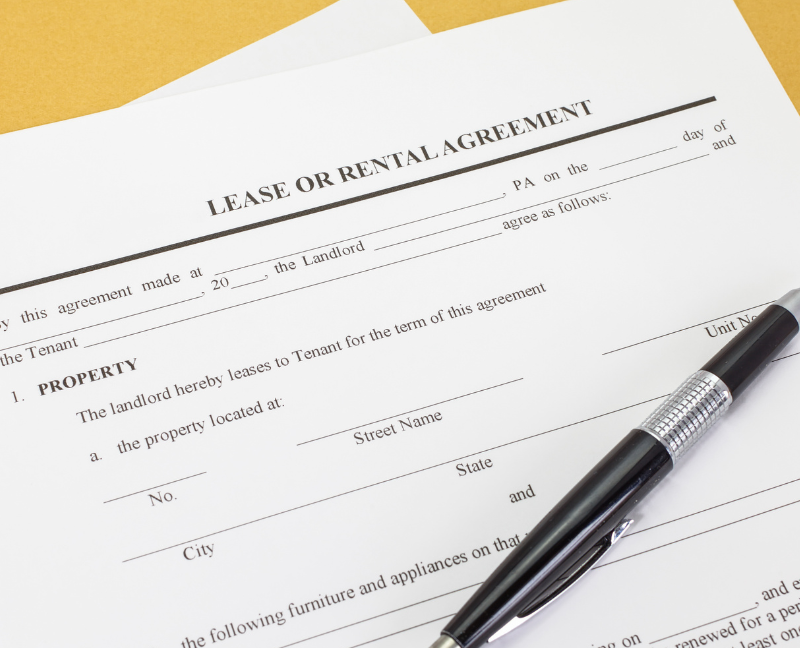
The rental process also includes choosing a monthly rent collection method. As rent payments become more accessible, this method will be streamlined. Mailing or dropping off paper checks might seem more convenient to landlords, but tenants may not have the time. Talk to the tenants and establish a straightforward approach to collecting monthly rent.
Advertising your home to potential tenants is a crucial step when making a list of what to do to rent out a house.
Word-of-mouth marketing is one approach to spreading the word about your rental property.
Another way is to contact your family, friends, and coworkers renting or knowing a tenant as well as putting your rental listing on social media or online rental property listing services.
Include all the property details potential tenants need in your online listing: bedrooms, bathrooms, rent, property age and condition, amenities, and other features. You must also provide high-quality images of the entire rental house.
After receiving interest from tenants, screen them to ensure they know when to rent your house. Other ways of tenant screening that you might want to consider include:
You or the property manager may request a move-out inspection. When a tenant leaves, this inspection checks the home to help landlords decide whether to return the whole security deposit or not.
You may require some inspections before renting out your home. An inspection where the landlord and tenant discuss the house's condition is required. This allows the landlord to record the home's condition before the renter moves in. Some landlords inspect the property regularly to ensure its condition.
Sign the lease and receive the security deposit when all inspections are complete. Your tenants will receive keys and discuss a move-in date.
The rental agreement covers:
Good tenant relations make renting your house easier. When there's mutual respect with tenants, they might be more motivated to pay rent on time and respect your property. That said, keep a cordial, communicative connection to give your tenants a safe and comfortable home.
If you're considering renting out your house, figure out the advantages and disadvantages to you and your property. Also, evaluate your finances and your capability to know if you're ready for the extra duties. After all, it may be worth the effort if you make a lot of money renting out your house, especially if you rent out numerous properties.
We are thrilled to invite you to a series of Open House events this weekend, where you can explore stunning homes in some of Indiana's most desirable neighborhoods. Whether you are looking for historic charm, modern amenities, or serene lakefront living, we have something special for you. Join us and discover the perfect home for you and your family. Here are the details of our Open Houses:
919 Broadway St Unit D, Indianapolis, IN 46202
Time: 12 PM - 3 PM
Hosted by: Jessica Montalvo | 317-912-3730
Own a piece of history with this stunning condo in the heart of Historic Chatham Arch Neighborhood. Built in 1890, this home seamlessly blends timeless elegance with contemporary city living. Positioned on a prized corner lot, you're just steps away from the new BottleWorks District and the vibrant atmosphere of Mass Avenue. Enjoy the variety of dining, shopping, and entertainment options right outside your door. This meticulously maintained home features beautiful hardwood floors, grand windows flooding the living room with natural light, and contemporary upgrades in the kitchen with stainless steel appliances and sleek granite countertops. Don't miss this exceptional condo in one of Indianapolis's most sought-after neighborhoods!
9049 W Forest Dr, Elwood, IN 46036
Time: 1 PM - 3 PM
Hosted by: Lori McCord | 317-258-9904
Welcome to the Forest Hills subdivision with no HOA and a private entry into the neighborhood. This beautiful home offers 4 bedrooms, 2 full bathrooms, a mud room, and a bonus room upstairs, with an additional living room in the basement. The property boasts hardwood floors, a great front porch, new windows, a water heater, a sewer pump, and a heated garage with A/C. With recent updates and a large yard, this home is perfect for families. The seller is providing an $800 flooring credit for the 2 bedrooms downstairs. Don't miss this opportunity!
1029 Pine Hill Way, Carmel, IN 46032
Time: 12 PM - 2 PM
Hosted by: Tony Sowers | 317-694-2940
Step into luxury with this immaculate 6-bedroom, 5.5-bath custom home in Cheswick Place. A grand 2-story entry welcomes you into a living room with soaring 14 ft ceilings, brand new hardwood floors, and a 2-sided fireplace. The updated kitchen is a chef's dream with ample prep space, a center island, and stainless steel appliances. The huge main level primary suite features a spa-like bath and walk-in closet. The lower level is perfect for entertaining with a home gym, theatre area, bar/kitchenette, storage, and an additional bedroom and full bathroom. Enjoy your private backyard with a large deck, fire pit, and plenty of green space. Recent improvements make this home truly move-in ready!
Discover this completely updated ranch home in the Center Grove school district. This home features a brand new roof, new engineered hardwood flooring, freshly painted interiors, and updated lighting fixtures. The kitchen boasts new cabinets, granite countertops, a new center island, and stainless steel appliances. The primary bathroom offers a glass walk-in shower with a luxury rainfall shower head. The nearly 1/2 acre yard is fully fenced with new landscaping and a newly painted storage shed. The garage is fully finished and freshly painted. Join us to see all the updates and enjoy the open house!
8360 S Indian Ridge Dr, Trafalgar, IN 46181
Time: 1 PM - 3 PM
Hosted by: The Rob Campbell Team
Rob Campbell | 317-695-1315 & Joyce Campbell | 317-691-4627
Experience lakefront living at its finest with this beautiful log home on Lamb Lake. With over 100 feet of lakefront, a boat dock, and spectacular views, this home offers the perfect blend of rustic charm and modern amenities. The main level features cozy hardwood peg flooring, a wood-burning fireplace, and an updated kitchen with quartz counters and new appliances. The primary bedroom opens to a private deck overlooking the lake. The walkout basement includes a second kitchen, bar, living room with a fireplace, and a bonus room. Enjoy the best of lake living with water-skiing, boating, fishing, and more, all just 30 minutes from Greenwood and 45 minutes from Indianapolis.
Don't miss your chance to find your dream home this weekend! For the latest updates and to be notified as soon as new homes hit the market, sign up on our website to receive your free list of exclusive property listings. We look forward to welcoming you at our Open House Extravaganza! See you there!

8313 W. 10th St
Indianapolis IN 46234
dennis@indyhomepros.com
317-316-8224